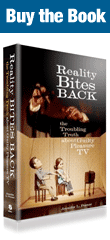Reality TV Deconstruction GuideCritical Thinking: The Building Blocks of Media Literacy Media literacy is our strongest weapon against propaganda and manipulation in today’s profit-driven media culture. Advertisers and media producers want us to watch their offerings passively, to zone out and let their messages wash over us uncritically. Playing games like Backlash Bingo or making Mad Libs out of the most outrageous or inappropriate reality show content can help you retrain yourself into active viewership. We need to change how we’ve been conditioned to receive media messages. Smart, empowered viewers take active notice of the ideas being sent through the dialogue and action of reality shows, examine the meaning embedded in their narratives, and note the production tricks used to convey those messages. I’m not here to tell you to stop watching reality TV. If you admire the fashions on Project Runway or enjoy laughing at Tool Academy’s alpha males, go right ahead. On the other hand, if Flavor of Love or Wife Swap gives you hives, by all means turn off your TV. Voting with your remote is one way to punish those networks and advertisers who bring us insulting, bottom-feeder schlock, especially if you back up that action with letters, calls, and emails explaining exactly why you’re saying no to their programming. You might even find your free time and your self-esteem increase as a result. (“Seriously, you need to turn that shit off.†In Lessons from the Fat-o-Sphere: Quit Dieting and Declare a Truce with Your Body, Kate Harding and Marianne Kirby advise readers to “stop watching television, or at least seriously reduce [y]our TV consumption†because televised images of women’s bodies are so consistently unhealthy and demeaning that they can’t help but affect our self-perceptions. “While you’re at it,†they suggest, “lock your women’s magazines away,†too. While I believe it is more empowering to learn how to actively deconstruct disturbing media than to reject it completely, I understand and respect their “media diet—the only kind of diet we recommend,†as it can be psychologically freeing.) But ignoring bad TV is a limited strategy: Simply tuning out won’t help you defend your psyche against equally problematic media messages coming at you from other directions. Nor will it give you the tools you need to help members of your community identify and challenge media representations that degrade women, demonize the poor, stereotype people of color, or marginalize LGBT people, the disabled, and immigrants. You don’t need to divorce yourselves from The Real Housewives, shoot down The Pick-Up Artist, or cancel your cable. Over the long haul, it’s far more important to learn how to watch: that is, how to resist the lure of passive viewership and turn your critical filters on high. Banish the phrase “mindless entertainment†from your vocabulary. The games in this chapter are enjoyable conversation starters, but you don’t have to rely on such prompts to engage your critical faculties. This can become second nature, if you keep some basic questions in mind whenever you engage with any form of media. The key to becoming media literate is learning to decipher not only what is being said and shown on-screen (the “text†of an episode of America’s Next Top Model, for example), but also the nature and meaning of the show’s underlying messages (the “subtextâ€). Top Model, for example, imparts many lessons about what types of bodies—and what kinds of women—are valuable and, in contrast, who among us are ugly, pitiful, worthless. While media literacy skills should be applied to all print, broadcast, online and social media, reality TV deserves particular attention. Unscripted programming claims to explore how “real people†feel about beauty, romance, marriage, money, ethnicity, sexuality, and more. Each series has a specific premise, and in support of that premise producers cherry-pick through hundreds of hours of videotape to choose each moment you see on air.
|






